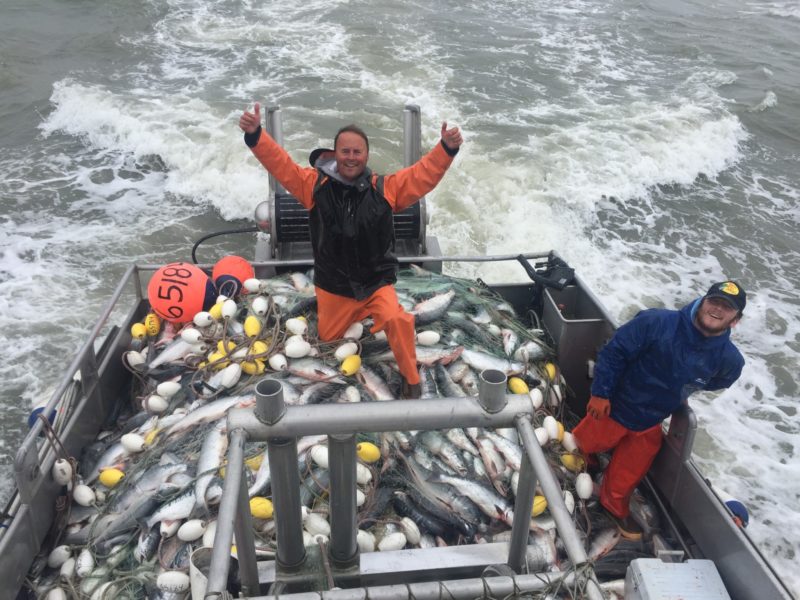The seafood industry is the lifeblood of many of Alaska’s communities. The industry is the third largest economic driver in Alaska and the top employer. Alaska accounts for more than 50 percent of total U.S. commercial fishery harvest in volume, which contributes more than 78,000 jobs to the Alaska economy. We are also the top exporter in the country of fish and seafood products.
I like to call Alaska a global seafood superpower.
Enhancing Alaska’s seafood powerhouse is one of the primary reasons I have fought to sit on the Senate Commerce Committee — which has fishing under its jurisdiction. As a member of that committee, I have worked relentlessly to continue the important work of my predecessor, Sen. Ted Stevens, who co-authored the Magnuson-Stevens Act. But there is a whole host of fisheries issues that also come before me, including ensuring that our fisheries remain healthy and vital, fighting burdensome regulations that would needlessly restrict access to our fishing resources, and, importantly, expanding the markets for our fisheries.
In my time as a senator, I’ve been working diligently on all of these priorities, and we’ve had some important successes. For instance, the Save Our Seas Act, a bill that I coauthored with Sheldon Whitehouse (D-R.I.) to help keep plastics out of our seas, was signed into law by the president in October. I recently negotiated a provision, known as the Vessel Incident Discharge Act, to provide Alaska fishing vessel owners and operators relief from a patchwork of overly burdensome and confusing federal and state regulations for vessel ballast water and incidental discharges.
We’ve also had important successes in Congress to expand markets for Alaska fisheries.
When I arrived in the Senate, I was surprised to learn that while the national school lunch program requires school districts to buy American-made food, fish had been largely excluded from those requirements in practice. It was a major loophole that allowed, for example, Russian-caught pollock, processed in China and injected with phosphates, to be sent back to the United States for purchase in the National School Lunch Program. And it qualified for a Product of USA label because it’s battered and breaded here.
Not only was this bad for Alaska’s fishing industry, the chemical-laden, twice-frozen fish that was served to students just didn’t taste good. It literally turned a generation of kids in America off of seafood.
It was a problem that the Alaska pollock producers had been working on for years, and in the most recent Farm Bill, we saw an opportunity to fix it. The bill, which President Trump signed in December, contained an amendment I authored requiring that only domestically landed and processed fish be included in the National School Lunch Program. This will greatly enhance the quality of food served to our kids and expand markets for our fishermen. It’s a win for our farmers, fishermen, our rural communities, and our children.
I was able to get another provision in a bill to further bolster fisheries in Alaska and across the country on the international market. Because of this provision, for the first time ever, fisheries are a principal negotiating objective for all new trade agreements. The measure will lead to a reduction or elimination of tariffs and non-tariff barriers, eliminate subsidies that distort trade, and open new markets for American fish, seafood, and shellfish products around the globe. Because of this provision, the recently negotiated U.S., Mexico, Canada Agreement — the renegotiated NAFTA — features multiple articles on fisheries, including phasing out subsidies, combatting illegal fishing, prohibitions on certain vessels and operations, and port state measures requirements.
Additionally, I worked hard to protect Alaskan-sourced seafood in the most recent tranche of tariffs on imports from China. Throughout the summer, I educated the administration on the unintended impacts of targeting certain seafood. These efforts culminated in testimony I offered before the U.S. International Trade Commission in August. As a result of these direct interventions, certain Alaskan salmon were spared from U.S.-imposed tariffs.
Going forward into the next Congress, I’ll continue to relentlessly work with our fishing industry to expand markets for American seafood, cut overly-burdensome regulations that hurt our fishermen, and continue to work toward conservation so that our fishing industry remains a viable career path well into the future.







